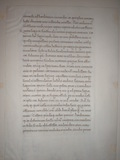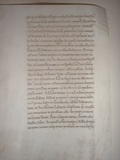Ohio University Leaf 39
This leaf comes from a rare manuscript of Livy's History of Rome (completed in about 9 A.D.) copied in Italy in the middle of the fifteenth century. It measures 22.5 x 16 cm and its vellum is very well prepared, though some rubbing of the ink has cast a shadow over the text block of some pages. The Humanistic script is crisp, clear, and without adornment; an exception is the Denison leaf, with its striking initial "H." See Denison University Leaf 39 for more information about this manuscript.
Text: This leaf contains the text of Livy's History, Book 27, Chapters 1-2. The English translation is that of Cyrus Edmonds (1850), via Project Gutenberg.
Reconstruction Note! In Ege's original manuscript, this leaf followed what is now Leaf 39 in the Denison University portfolio.
 Ohio University Leaf 39 Recto
Ohio University Leaf 39 Recto
Ohio University Leaf 39 Recto
 Ohio University Leaf 39 Recto Transcription
Ohio University Leaf 39 Recto Transcription
itineribus ad Herdoneam contendit et, quo plus terroris hosti obiceret, acie instructa accessit. par audacia Romanus, consilio et uiribus impar, copiis raptim eductis conflixit. quinta legio et sinistra ala acriter pugnam inierunt; ceterum Hannibal signo equitibus dato ut, cum pedestres acies occupassent praesenti certamine oculos animosque, circumuecti pars castra hostium, pars terga trepidantium inuaderent, ipse Cn. Fului similitudinem nominis—quia Cn. Fuluium praetorem biennio ante in iisdem deuicerat locis—increpans, similem euentum pugnae fore adfirmabat. neque ea spes uana fuit. nam cum comminus acie et peditum certamine multi cecidissent Romanorum, starent tamen ordines signaque, equestris tumultus a tergo, simul a castris clamor hostilis auditus sextam legionem, quae in secunda acie posita prior ab Numidis turbata est, quintam deinde atque eos qui ad prima signa erant auertit; pars in fugam effusi, pars in medio caesi, ubi et ipse Cn. Fuluius cum undecim tribunis militum cecidit. Romanorum sociorumque quot caesa in eo proelio milia sint, quis pro certo adfirmet, cum tredecim milia alibi, alibi haud plus quam septem inueniam? castris praedaque uictor potitur. Herdoneam, quia et defecturam fuisse ad Romanos comperit nec mansuram in fide, si inde abscessisset, multitudine omni Metapontum ac Thurios traducta, incendit: occidit princi-
 Ohio University Leaf 39 Recto Translation
Ohio University Leaf 39 Recto Translation
...With a lightly equipped force he hastened to Herdonea by forced marches, so as almost to anticipate the report of his approach and in order to strike greater terror into the enemy, came up with his troops in battle-array. The Roman, equal to him in courage, but inferior in strength, hastily drawing out his troops, engaged him. The fifth legion and the left wing of the allied infantry commenced the battle with spirit. But Hannibal ordered his cavalry, on a signal given, to ride round as soon as the foot forces had their eyes and thoughts occupied with the contest before them, and one half of them to attack the camp of the enemy, the other half to fall upon their rear, while busily engaged in fighting. He himself, sarcastically alluding to the similarity of the name Fulvius, as he had defeated Cneius Fulvius, the praetor, two years ago, in the same country, expressed his confidence that the issue of the battle would be similar. Nor was this expectation vain; for after many of the Romans had fallen in the close contest, and in the engagement with the infantry, notwithstanding which they still preserved their ranks and stood their ground; the alarm occasioned by the cavalry on their rear, and the enemy shout, which was heard at the same time from their camp, first put to flight the sixth legion, which being posted in the second line, was first thrown into confusion by the Numidians; and then the fifth legion, and those who were posted in the van. Some fled precipitately, others were slain in the middle space, where also Cneius Fulvius himself, with eleven military tribunes, fell. Who can state with certainty how many thousands of the Romans and their allies were slain in this battle, when I find in some accounts that thirteen, in others that not more than seven, thousand were slain? The conquerors got possession of the camp and the spoil. Finding that Herdonea would have revolted to the Romans, and was not likely to continue faithful to him if he departed thence, he removed all its inhabitants to Metapontum and Thurium, and burnt it. He put to death...
 Ohio University Leaf 39 Verso
Ohio University Leaf 39 Verso
Ohio University Leaf 39 Verso
 Ohio University Leaf 39 Verso Transcription
Ohio University Leaf 39 Verso Transcription
principes qui cum Fuluio conloquia occulta habuisse comperti sunt. Romani qui ex tanta clade euaserant diuersis itineribus semermes ad Marcellum consulem in Samnium perfugerunt. [2] Marcellus nihil admodum tanta clade territus litteras Romam ad senatum de duce et exercitu ad Herdoneam amisso scribit: ceterum eundem se, qui post Cannensem pugnam ferocem uictoria Hannibalem contuderit, ire aduersus eum, breuem illi laetitiam qua exsultet facturum. et Romae quidem cum luctus ingens ex praeterito, tum timor in futurum erat: consul ex Samnio in Lucanos transgressus ad Numistronem in conspectu Hannibalis loco plano, cum Poenus collem teneret, posuit castra. addidit et aliam fidentis speciem, quod prior in aciem eduxit; nec detractauit Hannibal, ut signa portis efferri uidit. ita tamen aciem instruxerunt ut Poenus dextrum cornu in collem erigeret, Romani sinistrum ad oppidum adplicarent. ab Romanis prima legio et dextra ala, ab Hannibale Hispani milites et funditores Baliares, elephanti quoque commisso iam certamine in proelium acti; diu pugna neutro inclinata stetit. ab hora tertia cum ad noctem pugnam extendissent, fessaeque pugnando primae acies essent, primae legioni tertia, dextrae alae sinistra subit, et apud hostes integri a fessis pugnam accepere. nouum atque atrox proelium ex iam segni
 Ohio University Leaf 39 Verso Translation
Ohio University Leaf 39 Verso Translation
...the chief men who were found to have held secret conferences with Fulvius. Such of the Romans as escaped this dreadful carnage, fled half-armed, by different roads, into Samnium, to the consul Marcellus. [2.] Marcellus, who was not much discouraged at this so great a disaster, sent a letter to the senate at Rome, with an account of the loss of the general and army at Herdonea; observing, however, "that he who, after the battle of Cannae, had humbled Hannibal when elated with victory, was now marching against him, and that he would cause that his present joy and exultation should not continue long." At Rome, indeed, the grief occasioned by what had occurred, and the fears entertained for the future, were excessive. The consul passing out of Samnium into Lucania, pitched his camp at Numistro, on a plain within view of Hannibal, who occupied a hill. He added also another demonstration of his confidence; for he was the first to lead out his troops to battle, nor did Hannibal decline fighting when he saw the standards carried out from the gates. However, they drew up their forces so that the right wing of the Carthaginians was extended up the hill, while the left wing of the Romans was contiguous to the town. For a long time neither side had any advantage; but the battle having continued from the third hour till night, and the first lines, which consisted, on the part of the Romans, of the first legion and the right wing of the allied infantry, on the part of Hannibal, of the Spanish soldiers, the Balearic slingers, and the elephants, which were driven into the field after the commencement of the battle, being fatigued with fighting, the first legion was relieved by the third, and the right wing of allied infantry by the left; while on the part of the enemy fresh troops took up the battle in place of those who were tired. A new and desperate conflict suddenly arose...